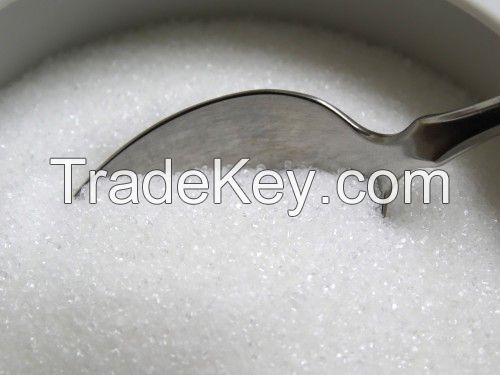

Prix FOB
Obtenir le dernier prix|
100 Metric Ton Minimum Order
Pays:
UAE
N ° de modèle:
-
Prix FOB:
Localité:
-
Prix de commande minimale:
-
Commande minimale:
100 Metric Ton
Packaging Detail:
50 KG Bags
Heure de livraison:
20-30 Days
Capacité de Fournir:
25000 Metric Ton per Month
Payment Type:
L/C, T/T
Groupe de produits :
-
Personne à contacter Mr. Johnson
2A, Ground Floor, Gold & Diamond Park ,Sheikh Zayed Road, Dubai, U.A.E, Dubai, Dubai
Brazilian Sugar :-
In many respects, the words sugar
and Brazil are practically synonymous. *0% of the worlds sugar
exports are made up of Brazilian sugar, and Brazil produces almost
*0 million tons of sugar every year for both domestic consumption
and sale abroad. Brazilians also love their sugar at a national
level, consuming more than fifty kilograms of sugar per person
every year.
The bulk of Brazilian sugar is grown in the Sao Paulo region, a
large, flat, fertile region which is very well suited to growing
sugar cane. As demand for sugar, and other sugar cane products has
grown in recent years, sugar cane cultivation in this region has
exploded to new levels, prompting concerns about the impact the
many plantations, mills, and refineries have on the
environment.
The other major sugar cane growing region exists in the northern
reaches of the country in the states of Algolas and Pernambuco
which are not quite as fertile and which contain much rougher
terrain. These states are the historical homes of sugar production
in Brazil however, as it was in these regions that the Dutch set up
the first sugar cane plantations and boiling houses using slave
labor in the early *6th century.
Making Brazilian Sugar :-
Modern sugar production has
progressed in leaps and bounds, and technology has replaced slave
labor. Brazil has been at the forefront of development in the sugar
industry for many years, sequencing the sugar cane genome,
developing over **0 strains of sugar cane, and devising milling and
refining methods that are so advanced that mills and refineries are
often able to sell excess energy back on to the national grid
rather than pay for power with which to conduct their
operations.
Brazil was also the inventor of VHP raw sugar, a raw sugar product
with a minimum sucrose content of *9.4% . Prior to the invention of
VHP raw sugar, raw cane juice would be boiled or evaporated until
all that was left was a dark brown natural sugar product full of
contaminants and mixed with molasses. This raw sugar required a
great deal of processing to refine it into the sparkling white
ICUMSA *5 sugar which has gained dominion throughout most of the
developed world as a sweetener of choice.
VHP sugar, on the other hand, is made by processing the raw cane
juice by boiling it until the solution is concentrated enough for
sucrose crystals to form, allowing the juice to cool so that the
crystals do form, and then centrifuging the solution and the
crystals. During the centrifugal process, the crystals are
separated from the remaining liquid content, which is molasses. The
molasses drawn off in the first centrifugal process are called
first molasses, and still contain a significant amount of sugar.
These molasses are then put through the entire process once more.
The sugar crystals produced at each stage of the process are a
light brown color and are what is called VHP sugar. Though still
raw, they contain less contamination, and can be refined much more
quickly and easily than traditional raw sugar. It is no surprise
then that the bulk of Brazils sugar exports are in the form of VHP
sugar.
Purchasing Brazilian Sugar :-
Brazilian sugar is traded on futures markets (south America Stock
Ex, London Stocks, NY Stocks), and also on various commodities
exchanges. License Sugar Dealers /Brokers are also good
source of sugar, especially if one is looking to purchase on a spot
price basis. Spot sugar trading involves the buyer purchasing
relatively small amounts of sugar at the current market rate for
immediate shipment. Larger orders are usually not subject to spot
trading, but are purchased from suppliers at negotiated prices and
are often shipped over a period of months.
It is quite common for sugar to be sold before it is actually
produced ( Sugar allocations), and in the case of large orders it
is fairly standard practice for a supplier to have a deal with a
growers/farmers whereby the mill is contracted to do the
processing/ refining the produce a certain amount of sugar over
certain period of time. This sugar is then transported to the port
of departure on a monthly schedule and subsequently sent to the
buyer who makes payment once each shipment is confirmed.
| Pays: | UAE |
| N ° de modèle: | - |
| Prix FOB: | Obtenir le dernier prix |
| Localité: | - |
| Prix de commande minimale: | - |
| Commande minimale: | 100 Metric Ton |
| Packaging Detail: | 50 KG Bags |
| Heure de livraison: | 20-30 Days |
| Capacité de Fournir: | 25000 Metric Ton per Month |
| Payment Type: | L/C, T/T |
| Groupe de produits : | - |